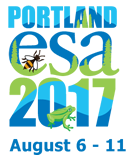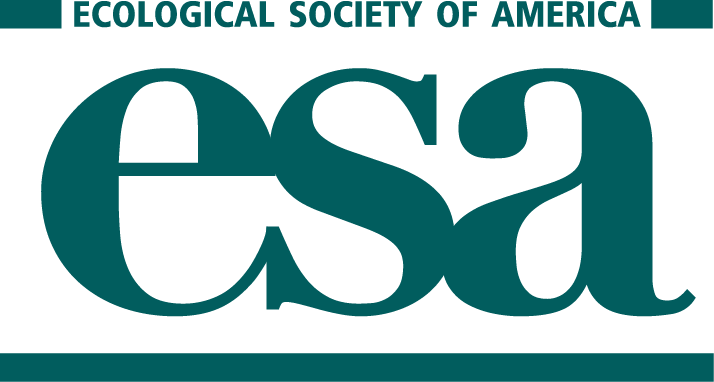2017 ESA Annual Meeting
Portland, Oregon
August 6 – 11, 2017
Deadline: 5:00 PM Eastern (2:00 PM Pacific)
Thursday, September 15, 2016
Proposals that are incomplete or received after the deadline will not be considered.
All ESA Annual Meeting proposal and abstract deadlines are 5:00 PM Eastern so that technical support and ESA staff assistance will be immediately available when submitters need it. If you begin your submission very close to the deadline, you are choosing to take a risk and we will not make an exception if you don’t complete your submission in time. The form automatically closes at 5:00 EST / 2:00 PST whether you have completed your submission or not.
About Symposia
We invite proposals for symposia for the 2017 ESA Annual Meeting. Symposia are the scientific centerpiece of the meeting and will be assigned premium meeting space. These sessions are distinguished from other organized sessions in that they are more explicitly integrated, provide an overall synthesis on their topic, and have broad enough appeal to generate large audiences at the meeting. Proposals are encouraged to address the meeting theme, “Linking Biodiversity, Material Cycling and Ecosystem Services in a Changing World,” if appropriate, but doing so is not necessary. Any timely and coherent subject of broad ecological interest will be considered. We also welcome proposals that explore interdisciplinary connections with areas of social and natural science outside of ecology or that relate to ecological education at any level. The meeting will include 24 symposia, each running for 3.5 hours. A symposium consists of 6 talks, each 30 minutes in length, followed by a 20 minute period devoted to discussion. Proposals listing more or fewer than 6 confirmed speakers will not be considered.
Proposal Format
All proposals must include:
- Session title.
- Organizer (Name, institution, email). This person is the point of contact for the session and responsible for communicating with speakers.
- Co-organizers (Names, institutions, emails).
- Moderator (Name, institution, email). The moderator may not serve as a speaker in this session. The organizer or co-organizer may serve as moderator.
- 6 Speakers (Name, institution, email, and tentative talk title for each). Only speakers who have been contacted and have committed to the session should be listed.
- Session description (< 400 words) : Should focus on the theme of the session. May include background information, goals, objectives, importance, and interest to the membership of ESA. The description should avoid overly specialized language. Any ecologist attending the meeting should be able to understand it. It will appear in the online program and be read by attendees deciding whether or not to attend the session.
- Session justification (< 250 words) : The justification should focus on how the review criteria are met by the proposal. It should not simply repeat the description.
- One sentence session summary (< 50 words): This is a very short version of the session description. It will appear in the print program and be read by attendees deciding whether or not to attend the session.
Review Criteria
All proposals will be peer reviewed and scored by reviewers selected by the ESA Program Committee. The Program Committee may accept, decline, or offer an opportunity to present the proposed work in a more appropriate format (organized oral session, workshop, or special session). Session organizers will be notified of decisions by December 8, 2016. Symposium proposals will be assessed using the following criteria. The weighting of particular criteria may vary depending on the nature of proposals.
A strong symposium proposal will:
Scientific strength
- offer significant contributions to ecological understanding.
- present innovative or interdisciplinary approaches, including novel collaborations or syntheses across subdisciplines of ecology or with other related disciplines.
- have broad enough appeal to generate large audiences (>250 people) at the meeting.
Structure and organization
- be more explicitly integrated than other oral sessions.
- provide strong overall synthesis or overview; they should not be simply a set of related case studies.
- avoid taking a narrow perspective on the symposium topic (organizers should carefully avoid the appearance of biases toward their own perspectives).
- build a well-integrated whole (each talk should have clear relevance to the overall synthesis provided by the symposium).
Speakers
- list exactly 6 CONFIRMED speakers (speakers who have been contacted and have committed to the session).
- include a specific title for every speaker’s talk.
- offer a diverse mix of speakers, each of whom brings new contributions to the session.
Other details to consider
In the interest of broadening participation, an individual is allowed to be the lead organizer for only one scientific session (symposium, organized oral, or organized poster). Speakers who commit to speaking in a symposium should be aware that the one presentation rule will be enforced. That is, anyone who is the presenter in the session cannot also present in another scientific session (symposium, organized oral, organized poster, contributed talk, contributed poster). Organizers are responsible for notifying any speakers they recruit about this rule. The one presentation rule does not apply to participants speaking in Ignite sessions, special sessions, workshops, or a plenary.
There is an exemption to the one presentation rule for an author submitting an abstract for a second presentation IF the second abstract is directly related to education or outreach. If you are unsure whether an exemption would apply in your case, please ask.
Please note that meeting registration is not waived or reduced for anyone participating in any capacity in a Symposium. This includes the session organizer(s), moderator, and speakers. All meeting attendees must register at the appropriate one day or full week rate. Organizers are responsible for making this clear to everyone they recruit to help with the session. No ESA funds are available for honoraria or to support participant travel.
If Your Proposal is Accepted
After acceptance decisions have been made and the scheduling for the meeting is underway, cancellations and schedule changes are very disruptive to meeting planning. It is therefore very important that symposium organizers obtain firm commitments from their invited speakers before submitting their proposal. If a proposal is accepted, the organizer will be required to submit an up to date version of the session details and confirmed speaker list in January. Organizers will be informed of their session’s time and date in mid February. Symposia may be scheduled for any oral session timeslot between Monday afternoon and Friday morning. The program committee will attempt to avoid any overt conflicts between sessions and will give organizers an opportunity to notify us of known scheduling conflicts (strictly defined as conflicts between accepted sessions).
Communication with speakers
If a proposal is accepted as a session, it is very important that the organizer communicates with speakers between December and August about the acceptance status of the session, the confirmation status of speakers, abstract requirements and deadlines, session scheduling information, and expectations for participation in the conference. Here are a few details that all speakers should know up front.
Miscommunication about them can disrupt session planning later in the process. We are unable to honor scheduling requests. When asking speakers to commit to the session, organizers should inform them that the session could be scheduled any day Monday through Friday. We cannot schedule or move a session to accommodate the availability of speakers. Speakers who fail to submit an abstract on time will be removed from the session. It is the responsibility of the session organizer to make sure each speaker submits an abstract for his/her talk using the unique link that will be emailed to each speaker in early February. It is important to make sure all of your speakers are aware of the abstract submission deadline early on. All speakers are required to register for the conference. Registration will not be waived or reduced for any speaker. We greatly appreciate the contributions of invited speakers, but due to the number of organized sessions, we typically invite over 800 speakers each year. ESA is not able to provide any financial assistance, stipends, waived or reduced registration, travel assistance, or paid lodging to speakers. Organizers are responsible for making this clear to their speakers early on when it is easier to replace speakers.
Cancellations
For session organizers
Once a symposium has been accepted and listed online, cancellation imposes a serious burden. Do not submit a proposal if you are uncertain that you will be able to fulfill your obligation to organize and conduct the session. Once a session is accepted by the Program Chair, cancellation by the session organizers will preclude the organizers from being allowed to submit any proposals for sessions for the 2018 ESA Annual Meeting.
For presenters
Instructions for how to cancel are included in all notification emails sent to presenters. Presenters should reply to any of those emails to cancel. For more detailed information, see our Cancellation Policy.
Important Dates
| September 15, 2016 | Deadline for submitting a proposal to ESA. |
| December 8, 2016 | Notification of acceptance sent to organizer. |
| January 9, 2017 | Deadline to submit session revisions and reaffirm speaker lists. |
| February 9, 2017 | Notification of scheduling (session date and time) sent to organizer. |
| February 23, 2017 | Deadline for speakers to submit abstracts. |
To Submit
You must submit your proposal using the online submission form. Proposals sent by email will not be considered. When you submit your proposal, you will be automatically notified of receipt by an email sent to the address that you provide. If you do not receive such a notification, please contact Program Coordinator Jennifer Riem at jennifer@esa.org to confirm that your proposal was received. You will be able to return to the proposal to edit it until the submission deadline has passed. Information on how to do so will be included in the automated email.
Questions?
| Dr Christopher Swan Program Chair Geography & Environmental Systems University of Maryland, Baltimore County Baltimore, MD 21250 Phone: (410) 455-3957 E-mail: Chris.Swan@umbc.edu |
| Jennifer Riem Science Programs Coordinator Ecological Society of America 1990 M Street, NW, Suite 700 Washington, DC 20036 USA Phone: (202) 833-8773 x 218 Email: jennifer@esa.org |



